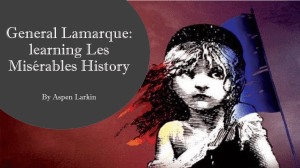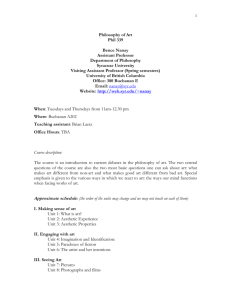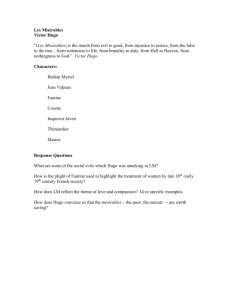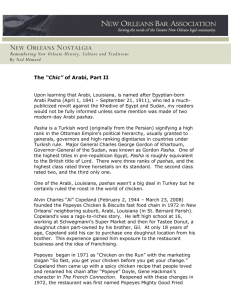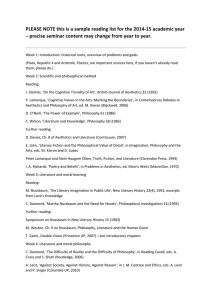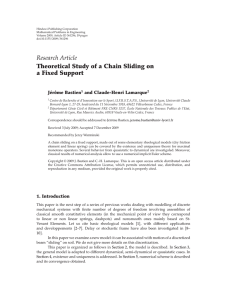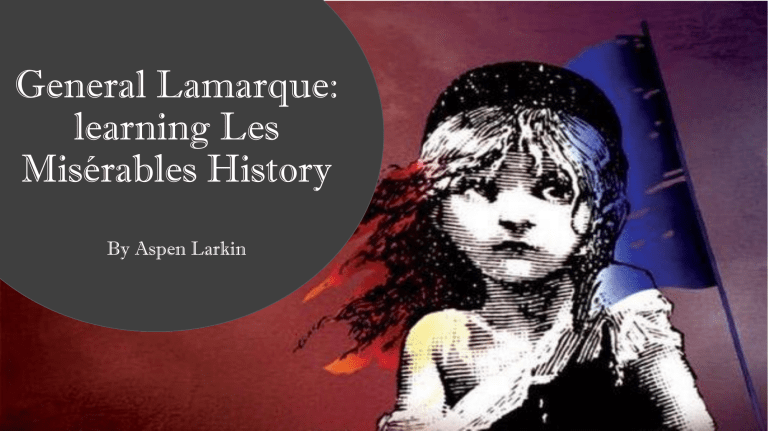
General Lamarque: learning Les Misérables History By Aspen Larkin Life of Lamarque • Born: July 22, 1770 • Place of Birth: Saint-Sever, Landes, France • Died: June 1, 1832 • Cause of Death: Illness • Place of Death: Paris, France Life of Lamarque continued • Lamarque was a member of a powerful and influential family. Lamarque's father was elected a member of the Third Estate to the Estates General of 1789. He was involved in early revolutionary and anti-clerical activity. • In 1793 he took part in the infamous "colonne infernale" led by Théophile Corret de la Tour d'Auvergne. In July 1794 he successfully took Hondarribia with a small force. In 1800 he was promoted to the rank of brigadier general. Who was General Lamarque? • Lamarque served in the Napoleonic army as a major general. He fought at the Battle of Austerlitz and the siege of Gaeta. In 1810, he was created a baron of the French Empire. During the Hundred Days he commanded a division of ten thousand men against a Royalist uprising in La Vendée. Lamarque defeated the rebellion, but his victory was nullified by Napoleon's defeat at Waterloo. • Lamarque went into exile after Waterloo but returned to France in 1818. He was elected to the French Chamber of Deputies in 1828. He fought in the suppression of Legitimist risings against the July Monarchy of LouisPhilippe. Lamarque's defense of constitutional liberties in Poland and Italy was very popular in France. He advocated French support for the rebels in Poland. Lamarque’s funeral • On the morning of June 5, 1832, a crowd started to gather in the streets. They were mourning General Lamarque’s death. General Lamarque had been a military leader in Napoleons army and earned the respect of the people by turning against the Orleans Monarchy. • This caused many people to gather and protest, rebels about 500-1000 people fought on the barricades How he became Champion of the poor? • After Louis Philippe took power as king, Lamarque continued to sit on the left and he supported reuniting Belgium with France, and the reconstitution of Poland as a nation. He also became known as one of Louis Philippe's chief political opponents. In 1831 Lamarque was rewarded with the Grand Cross of the Legion of Honor and due to his outspoken politics he became known as a defender of the people. • Hugo views Lamarque as the government's champion of the poor. Hugo says that Lamarque was "loved by the people because he accepted the chances the future offered, loved by the mob because he served the emperor well". Hugo portrays Lamarque as a symbol of French pride and honour. Les Misérables inspiration • The June Rebellion, also known as the Paris Uprising of 1832, took place between June 5-6, 1832. Anti-monarchist republicans began the uprising attempting to turn back the 1830 July Monarchy. During the public funeral of General Jean Maximilien Lamarque on June 5, the rebellion began. Barricades surrounding the rue Saint-Martin and rue Saint-Danis were built. This event inspired Victor Hugo, for his 1862 novel Les Misérables. General Lamarque in Les Misérables • However, he soon became a leading critic of the new constitutional monarchy of Louis Philippe, arguing that it failed to support human rights and political liberty. He also advocated French support for independence struggles in Poland and Italy. In the musical Gavroche and Enjolras briefly talk about his influence over the people. June Rebellion • The rioting (on 5–6 June) was provoked by both Bonapartists and republicans and led to an attempted insurrection known as the June Rebellion. It was suppressed by the Army and National Guard; an estimated 800 were killed or wounded during the conflict. Sources • https://lesmiserables.fandom.com/wiki/Jean_Maximilien_Lamarque • https://www.frenchempire.net/biographies/lamarque/ • https://sites.google.com/site/thejunerebellionof1832/subtopic-2 • https://historythings.com/victor-hugos-inspiration-les-miserablesjune-rebellion-1832/
